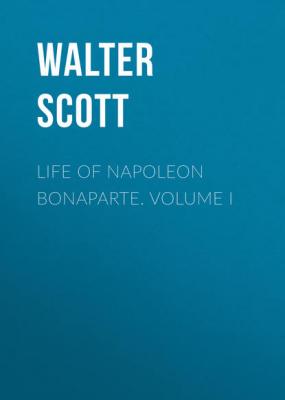Life of Napoleon Bonaparte. Volume I. Вальтер Скотт
Чтение книги онлайн.
Читать онлайн книгу Life of Napoleon Bonaparte. Volume I - Вальтер Скотт страница 36
 of their pikes.' Her prediction was accomplished." – M. de Staël, vol. i., p. 344.
of their pikes.' Her prediction was accomplished." – M. de Staël, vol. i., p. 344.
112
It has been said that they were borne immediately before the royal carriage; but this is an exaggeration where exaggeration is unnecessary. These bloody trophies preceded the royal family a great way on the march to Paris. – S.
113
"Nous ne manquerons plus de pain; nous amenons le boulanger, la boulangère, et le petit mitron!" – Prudhomme, tom. i., p. 244.
114
Prudhomme, tom. i., p. 243.
115
"The King said to the mayor, 'I come with pleasure to my good city of Paris;' the Queen added, 'and with confidence.' The expression was happy, but the event, alas! did not justify it." – M. de Staël, vol. i., p. 344.
116
The Mayor of Paris, although such language must have sounded like the most bitter irony, had no choice of words on the 6th October, 1789. But if he seriously termed that "a glorious day," what could Bailli complain of the studied insults and cruelties which he himself sustained, when, in Oct. 1792, the same banditti of Paris, who forced the King from Versailles, dragged himself to death, with every circumstance of refined cruelty and protracted insult? – S. – It was not on the 6th October, but the 17th July, three days after the capture of the Bastile, that Bailli, on presenting Louis with the keys of Paris, made use of this expression. – See Prudhomme, tom. i., p. 203.
117
"As the arrival of the royal family was unexpected, very few apartments were in a habitable state, and the Queen had been obliged to get tent-beds put up for her children in the very room where she received us; she apologized for it, and added, 'You know that I did not expect to come here.' Her physiognomy was beautiful, but irritated; it was not to be forgotten after having been seen." – M. de Staël, vol. i., p. 345.
118
Lacretelle, tom. vii., p. 265.
119
"On being informed of the King's determination to quit Versailles for Paris, the Assembly hastily passed a resolution, that it was inseparable from the King, and would accompany him to the capital." – Thiers, tom. i., p. 182.